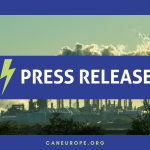LETTER
To:
Executive Vice President Frans Timmermans
Director General Mauro Petriccione
HoU Tom Van Ierland, advisor Stefan Vergote
Energy Commissioner Kadri Simson
Director General Ditte Juul Jorgensen
HoU Catharina Sikow-Magny, HoU Alejandro Ulzurrun
We write to you in the middle of a climate crisis with unprecedented scale and impact resulting in record temperatures beyond our imagination over the last decade. With precious few years left to limit global warming to 1.5°C, urgent action on methane is required. Methane is 86 times more potent than carbon-dioxide over a 20-year period, making it the second most important greenhouse gas, contributing to a quarter of warming experienced today.
In the coming months, the European Commission has the opportunity to take meaningful action to address methane emissions in the energy sector — with global implications. Methane emissions are inextricably linked to fossil-fuel extraction and use, and once exploited, unused and abandoned wells and mines continue to emit into the atmosphere. To date, methane emissions in the energy sector have been severely underestimated and recent satellite technologies have produced–to startling effect–dramatic images of unabated venting and leakage across the supply chain.
We therefore call on the European Commission to work toward a swift and ambitious phase-out of all fossil fuels. To this end, Member States should be required to produce plans to phase out fossil gas by 2035 with concrete steps and strategies. Similarly, all funding, support or permitting for further expansion of fossil-fuel infrastructure should cease immediately.
In the interim, however, much can still be done. We therefore also call on the European Commission to submit a robust legislative proposal on methane setting out a mandatory framework for measurement, reporting, verification (MRV) and leak detection and repair (LDAR) with a ban on routine venting and flaring (BRVF). The MRV-LDAR-BRVF framework should apply across the supply chain to cover all oil, gas and coal consumed in the EU (though provision may be required to allow importers to demonstrate compliance with measures comparable in effectiveness).
In addition, we also seek a ban on placing fracked gas on the EU market alongside wet gas extracted via fracking for use as a feedstock in the petrochemical sector. Studies show fracking is linked to spikes of methane in our atmosphere and the dense accumulation of fracking wells in shale basins make control and elimination of methane emissions very difficult, if not impossible.
Finally, we urge a strong level of caution when setting up the process and rules for tackling methane emissions and should not include the use of offsets as a tool for mitigating methane. The decades-long push to use fossil gas as a bridge fuel has resulted in a fossil gas-dependent economy at odds with EU climate objectives. All methane mitigation measures must be designed by independent experts, clear from any conflicts of interest, in order to avoid becoming a tool for greenwashing, justifying the continued use of fossil gas, locking in infrastructure and preventing the transition to a 100% renewables-based energy system.
We would welcome the opportunity to discuss these topics with you further, and therefore request a joint e-meeting in the coming weeks to exchange views.
Kind regards,
Frida Kieninger, Food & Water Action Europe
Tim Grabiel, Environmental Investigation Agency
Esther Bollendorf, Climate Action Network Europe



